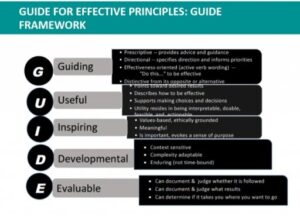On January 23rd, the Tamarack Institute held a conversation with Michael Quinn Patton exploring his latest book – Principles-Focused Evaluation: The GUIDE, released in November 2017. The webinar explored the principles-focused evaluation (P-FE) approach and its relevance and application in a range of settings. Quinn Patton presented why principles matter for program development and evaluation and how they can serve as a rudder to navigate the uncertainties, nuances, and emergent challenges of complex dynamic environments (such as those in humanitarian contexts).
 Principles provide guidance, based on norms, values, experience, and knowledge. For the purposes of evaluation, they can serve as helpful hypotheses and evaluators can question: if they prove meaningful to those whom the principles are meant to provide guidance; if the principles are adhered to; and if so, do they lead to the desired results? Principles can thus be evaluated for both process as well as results.
Principles provide guidance, based on norms, values, experience, and knowledge. For the purposes of evaluation, they can serve as helpful hypotheses and evaluators can question: if they prove meaningful to those whom the principles are meant to provide guidance; if the principles are adhered to; and if so, do they lead to the desired results? Principles can thus be evaluated for both process as well as results.
Webinar discussion emphasized several relevant aspects of RBP and outcome-oriented methods, namely:
- Principles can be evaluated. While intervention design and evaluation are usually heavily project-oriented (mostly closed systems), as the world changes we need to grapple with systems, innovations, relationships, collective efforts, strategies, etc. P-FE frameworks can help us illuminate and assess complexity.
- Principles are not prescriptive “recipes” but adaptive, related to context/ situation. P-FE is not anti-project/ recipe, but it recognizes that those only work in simple spaces. To acknowledge complex, dynamic environments, principles are more appropriate.
- PF-E presents an alternative to the conventional “SMART” goals utilized in evaluation of humanitarian programs, and posits that the GUIDE framework (Guiding, Useful, Inspiring, Developmental, Valuable); may be more helpful for evaluating principles.
- Sometimes principles are founded at the start of an intervention; however, they may also emerge through learning and action.
- There is value of engaging evaluators on the “front end” as opposed to later or post-intervention. Similar to developmental evaluations, bringing in evaluators early-on yields benefits for fostering a dynamic co-creation environment where evaluation observations may inform design and course-correction.
This webinar was also the official launch for the upcoming Evaluation Master class that Michael Quinn Patton and Mark Cabaj will be hosting in four Canadian cities this March. If you want to learn more about those 1-day deep dive learning experiences, find more information here.